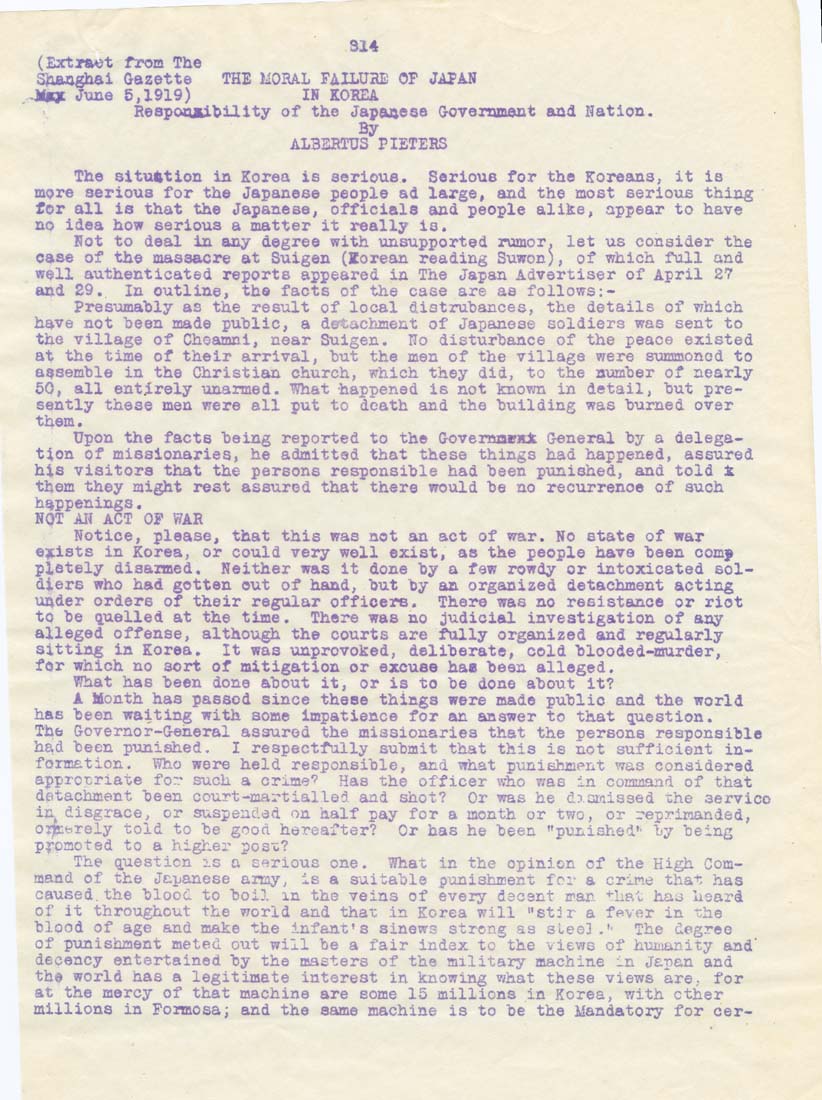314
(Extract from The
Shanghai Gazette THE MORAL PAILUBE OP JAPAN
,.4teJ[ June 5,1919) IN KOBEA
RespoiuKLblllty of the Japanese Gcvenuaent and Nation.
By
AL3SETUS PIETERS
The situation in Korea is serious. Serious for the Koreans, it is
more serious for the Japanese people ad large, and the most serious thing
tor all is that the Japanese, officials and people alike, appear to have
no idea how serious a matter it really is.
Not to deal in any degree with unsupported rumor, let us consider the
case of the massacre at Suigen (Eorean reading Suwon), of which full and
well authenticated reports appeared in The Japan Advertiser of April 27
and 29. In outline, the facts of the case are as follows:-
Presumably as the result of local distrubances, the details of whioh
have not been made public, a detachment of Japanese soldiers was sent to
the village of Choamni, near Suigen. No disturbance of the peace existed
at the time of their arrival, but the men of the village were summoned to
assemble in the Christian church, which they did, to the number of nearly
50, all entirely unarmed. What happened is not known in detail, but pre¬
sently these men were all put to death and the building was burned over
them.
Upon the facts being reported to the Govermaeait General by a delega¬
tion of missionaries, he admitted that these things had happened, assured
his visitors that the persons responsible had been p^unished, and told k
them they might rest assured that there would be no rec^urrenoe of suoh
happenings.
NQT AN ACT OP WAE
Notice, please, that this was not an. act of war. No state of war
ejtists in Korea, or could very well exist, as the people have been comf
pletely diaaimed. Neither was it done by a few rowdy or intoxicated sol¬
diers who had gotten out of hand, but by aa organized detachment acting
tmder orders of their regular officers. There was no resistauioe or riot
to be quelled at the time. There was no judicial investigation of any
alleged offense, although the courts are fully organized and regularly
sitting ia Korea. It was unprovoked, deliberate, cold blooded-murder,
for which no sort of mitigation or excuse haa been alleged.
What has been done about it, or is to be done about it?
A Month has passed since these things were made public and the world
has been waiting with some Impatience for an aaswer to that questioa.
The Governor-General assured the missionaries that the persons responsible
had been punished. I respectfully submit that this is not sufficient in¬
formation. Who were held responsible, and what punishment was considered
approT:riate for.- such a crime"? Has the officer who was in command of that
detachment been court-martialled amd shot? Or was he dxaraissed the service
in disgrace, or suspended oa half pay for a month or two, or reprimanded,
oi^brely told to be good hereafter? Or has he been "punished'' "by being
pj-pmoted to a higher post?
The question is a serious one. What in the opinion of the High Com¬
mand of the Japanese army, Is a suitable punishment fcr a crime that has
caused.the blood to boil m the veins of every decent man ^list has Lsard
of it throughout the world and that in Korea will "stir a fever in the
blood of age and make the infant's sinews strong as slee] .'• The degree
of punishment meted out will be a fair index to the views of hunianity and'
decency entertained by the masters of the military machine in Japan and
the world has a legitimate Interest in knowing what these views are, for
at the mercy of that machine are some 15 millions in Korea, with ether
millions ia Ponnosa; and the SMie machine is to be the Mandatory for cer-
|








